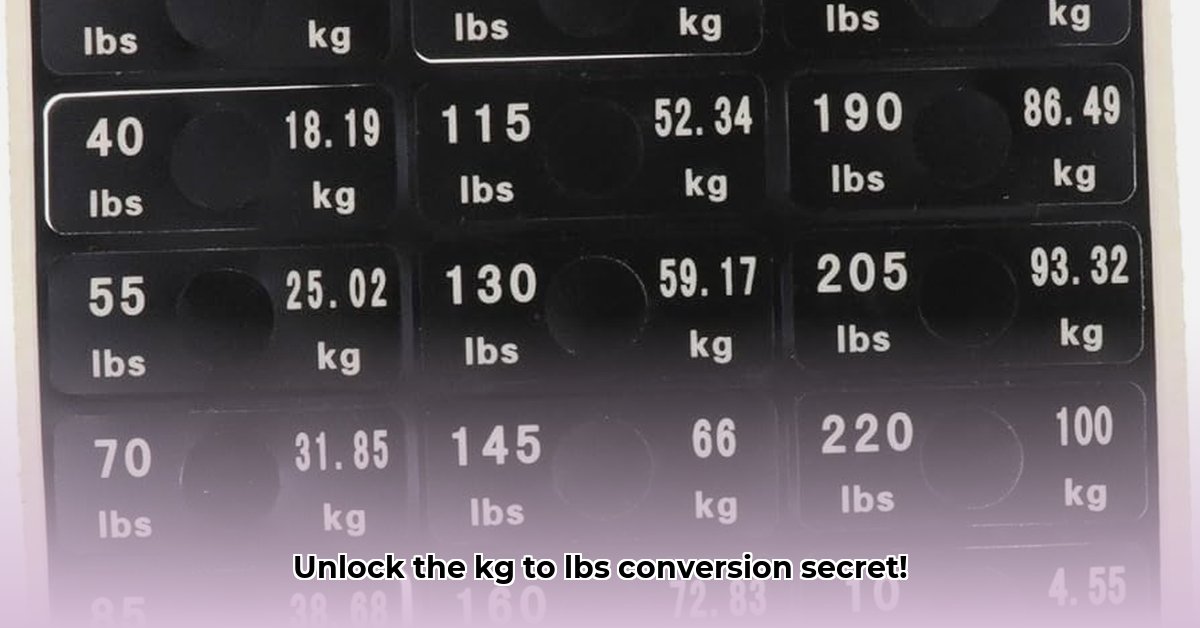
Ever need to convert kilograms to pounds? Whether you're following a foreign recipe, checking luggage weight, or conducting a scientific experiment, accurate unit conversion is crucial. This guide provides two methods: a precise calculation and a handy approximation, explaining when each is most suitable. For more detailed conversion examples, see this helpful kg to lbs converter.
Understanding Kilograms and Pounds
Before performing the conversion, let's clarify the distinction between kilograms (kg) and pounds (lbs). Kilograms measure mass, the amount of matter in an object. Pounds measure weight, the force of gravity on that mass. While often used interchangeably in casual conversation, the difference is significant in precise scientific or engineering contexts. The pound is a unit within the avoirdupois system, predominantly used in the US.
Two Methods for Conversion: Precision vs. Approximation
We can convert 4.55 kg to lbs using two approaches: a precise method and an approximate shortcut.
1. The Precise Method
This method employs the exact conversion factor: 1 kg = 2.20462 lbs. This yields the most accurate result.
Calculation:
4.55 kg * 2.20462 lbs/kg = 10.03103 lbs
This precise result is 10.03103 lbs.
2. The Approximate Method
This faster method uses the commonly known approximation: 1 kg ≈ 2.2 lbs. While less precise, it's sufficient for many everyday situations.
Calculation:
4.55 kg * 2.2 lbs/kg = 10.01 lbs
This approximate result is 10.01 lbs.
Here's a comparison table:
| Method | Conversion Factor | Calculation | Result (lbs) | Accuracy | Best Use |
|---|---|---|---|---|---|
| Precise | 2.20462 | 4.55 kg * 2.20462 lbs/kg | 10.03103 lbs | High | Scientific research, precise engineering |
| Approximate | 2.2 | 4.55 kg * 2.2 lbs/kg | 10.01 lbs | Moderate | Everyday situations, quick estimations |
Choosing the Right Method: Context Matters
The choice between these methods depends entirely on the context. For situations requiring high accuracy, such as scientific experiments or international trade, the precise method is essential. Even small discrepancies can have significant consequences in these contexts. However, for everyday use, such as weighing groceries or luggage, the approximate method provides a sufficiently accurate estimate.
Converting Decimal Pounds to Ounces
The precise conversion resulted in 10.03103 lbs. To express this in pounds and ounces, we convert the decimal portion:
0.03103 lbs * 16 oz/lb ≈ 0.5 oz
Therefore, 10.03103 lbs is approximately 10 lbs and 0.5 oz.
Beyond the Basics: Significant Figures and Further Unit Conversions
In scientific work, paying attention to significant figures is critical. The number of decimal places reported should reflect the accuracy of the measurement and conversion process. Similar conversion techniques apply to other weight units, like converting grams to ounces, requiring appropriate conversion factors and careful consideration of the context.
Conclusion: Accuracy Based on Context
Converting 4.55 kg to lbs requires selecting the appropriate method based on the needed accuracy. Understanding the difference between mass and weight and the trade-off between precision and speed is key. Always choose the precise method when accuracy is paramount and the approximate method for quick estimates in less critical situations.